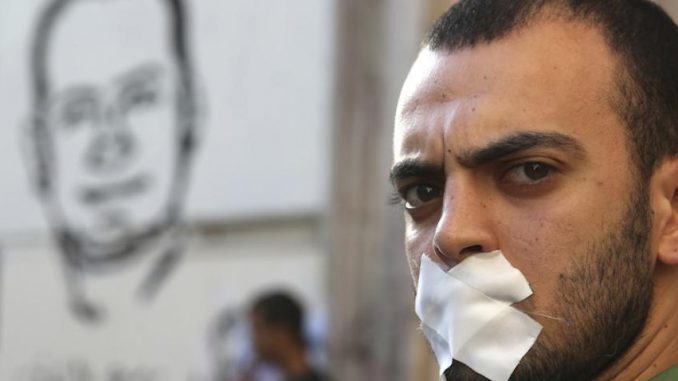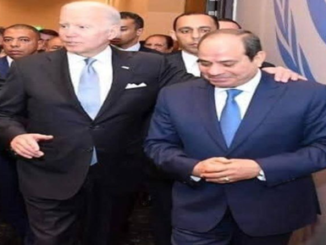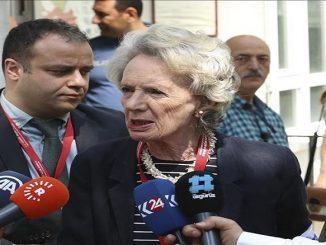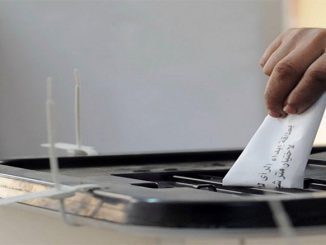
Late on Tuesday, Egyptian police raided the office of a news website and arrested its editor-in-chief, according to three of its journalists, including its managing editor.
The raid came two days after the Supreme Council for Media Regulation, an official oversight body, told the website, Masr al-Arabia, to pay 50,000 Egyptian pounds ($2,849) as a fine for republishing a New York Times article on alleged irregularities during last week’s presidential election.
Two journalists at the website quoted the site’s lawyers as saying that police said they had acted because the website did not have a permit to operate. The journalists said the raid was prompted by the republishing of the New York Times article.
A statement from the Supreme Council for Media Regulation, which was based on a complaint from the national election authority, on Sunday, accused the website of publishing false news.
The Council statement said,”The website should have checked the authenticity of the news or commented on it with an opinion. The Council was referring to the New York Times article, which said some voters were offered payments and other inducements to vote.
The New York Times defended its reporting. Danielle Rhoades Ha, a spokeswoman for the New York Times Co, said in an emailed statement,” We stand by the accuracy of our reporting and strongly condemn any arrests meant to intimidate journalists and stifle freedom of the press.”
Adel Sabry, the website’s editor-in-chief, was arrested and is being held at Dokki police station in greater Cairo, according to Mohamed Mounir, Masr al-Arabia’s managing editor.
A security source at the police station said Sabry was being held prior to appearing before a prosecutor. Sabry is accused of running a news website without a permit, the source added.
The office of the website was closed and “sealed with red wax”, the three journalists said.
Masr al-Arabia is one of about 500 websites that in recent months have been blocked in Egypt, although some are still accessible through virtual networks. Rights groups say the closures amount to a crackdown against freedom of expression.
Authorities say curbing fictitious news is necessary for national security.
Abdel Fattah al-Sisi won a second term with 97 percent of the votes on a turnout of 41 percent, official results showed on Monday.
Some voters have said they were offered incentives to cast their ballots including money and food, local and international media reported, without saying who had made the offers. Officials said that if any such incidents took place they were not state-sponsored and extremely limited.
On Wednesday, The Committee to Protect Journalists (CPJ), a United States-based watchdog, condemned Egypt for the crackdown on media outlets in the run-up to the elections.
CPJ said it condemns the retaliatory measures taken by Egyptian authorities against the independent news website Masr al-Arabia for its coverage of last week’s presidential elections and calls on the authorities to release the website’s editor.
“Having threatened the press ahead of the vote, various Egyptian authorities now appear to be competing to see who can most stringently enforce censorship in the wake of Abdel Fattah el-Sisi’s reelection,” CPJ’s Middle East and North Africa Coordinator said.
“We call on the Egyptian government to ease this relentless crackdown and let the news media do its job of holding power to account.”
CPJ’s requests for comment sent via email to Egyptian media regulators and the prosecutor general’s office were not immediately answered.
Al-Sisi’s Regime Widen Crackdown on Media
The news of Sabry’s detention came after the arrest and deportation from Egypt late last month of Bel Trew, a British reporter with the Times of London.
The newspaper has since denounced “the oppressive environment” for journalists created in the country by authorities before a presidential election.
According to Egyptian journalists, the crackdown on journalists in Egypt is likely to continue even after the completion of the elections.
“Sabry’s arrest is the latest in a series of measures taken [by the state] to stifle dissent as part of a widening crackdown on the media in Egypt,” said an Egyptian journalist, who wished to remain anonymous for fear of repercussions.
“It is an indication that the freedom of speech and the crackdown on journalists in Egypt will not east after the elections,” added the journalist, who is also a member of the Egyptian Journalists’ Syndicate.
The CPJ dubs Egypt “one of the world’s biggest prisons for journalists”.
With at least 20 journalists behind bars in relation to their work, Egypt is among the world’s top three jailers of journalists.
Reporters Without Borders ranks the country 161st out of 180 countries in its press freedom index.
Egypt’s Journalists Spoke Out Against Press Crackdown
Egyptian journalists have spoken out in support of a detained news website editor, saying state authorities targeted him over the outlet’s coverage of the country’s recent presidential elections.
Fellow journalists said they believe Sabry was targeted for the website’s coverage of the Egyptian elections and its criticism of state authorities.
Kotb al-Arabi, an Egyptian journalist, and media analyst said, “Masr al-Arabia’s editor-in-chief was arrested because the website is one of few independent news outlets in Egypt.”
He added,”Sabry was detained because the website’s coverage of the elections was critical and didn’t toe the official narrative.”
A member of staff at Masr al-Arabia, who wished to remain anonymous for security reasons, said that the news website was targeted because it had not “submitted to the regime.”
“The government wants no one but hypocrites. [Sabry was detained] because the website includes different voices and points of view … in addition to siding with the 25th of January Revolution,” the member of staff added, referring to the uprising that toppled former President Hosni Mubarak’s 30-year rule.



